Welcome to the SimCity bureau
DOHA, May 4, 2015 - It was done on a whim. In the dying minutes of a slow night shift in Paris, I noticed that AFP was setting up a bureau in Qatar. For a news reporter who is also a football anorak (you may have heard the country is hosting a World Cup), it seemed a perfect fit.
Twenty-four hours of procrastination, one e-mail of application, several months and a pair of newborn twins later, here I am in Doha, looking down at traffic jams and up at the sun from the 15th floor of a gleaming glass-covered skyscraper.
Opening a bureau can sound implausibly romantic, harking back to a different age of journalism associated with the click of a typewriter, the whir of a rotary dial phone and the right to smoke in the office. Like something you might dream of when starting out in the field, as distant and exciting as your first byline, front page or exclusive.
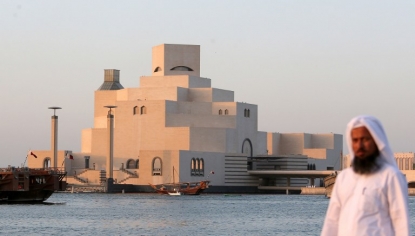 The Museum of Islamic Art in Doha in June 2014 (AFP Photo / Al-Watan Doha / Karim Jaafar)
The Museum of Islamic Art in Doha in June 2014 (AFP Photo / Al-Watan Doha / Karim Jaafar)The reality, I have found, is often more prosaic, with long hours eaten up by such mundane matters as chasing visas, ordering staples, and battling to get the office television up and running. But it still has its glamorous moments.
Seated next to royalty
In my first few months here, I have lunched on a beach with an ambassador, been pearl diving in the Gulf, heard Kylie sing (shouty), met Neymar (tiny) and watched tennis with David Beckham (smiley).
I have felt the journalistic buzz of stumbling across an exclusive while attending a staid conference (Qataris love a conference). Speaking at an arts conference in Doha, the boss of Qatar Airways suddenly launched into an attack on the “crap” planes of a competitor. Asked if he meant what he said, he fortunately replied yes. Even more fortunately, I seemed to be the only journalist there.
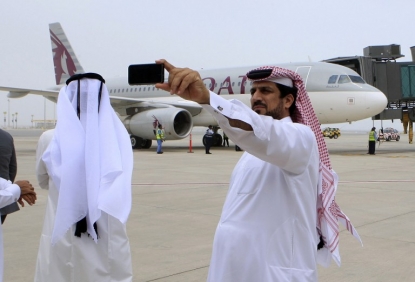 Qataris take pictures at Doha's new Hamad International Airport (HIA) in April 2014 (AFP Photo / Al-Watan Doha / Karim Jaafar)
Qataris take pictures at Doha's new Hamad International Airport (HIA) in April 2014 (AFP Photo / Al-Watan Doha / Karim Jaafar)Improbably, at the time I was sitting next to a British royal who, just to add to the absurdity of the occasion, congratulated me on getting the story then patted me on the back. I was so happy, I felt like bowing.
Blank canvas to paint
As if to pull me back down to earth, I was cheerfully warned soon after by one court official that I could go to prison if my report on the case was “too bombastic”. I was so impressed by his choice of adjective, I almost forgot he was serious.
The real beauty of a new bureau is being thrown into the deep end to discover and explore a new country. You have a blank canvas on which to paint.
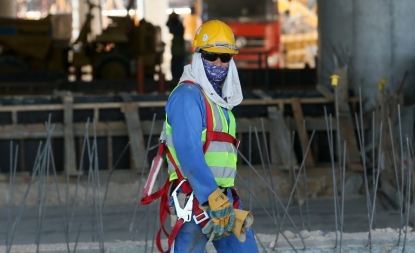 A migrant labourer in Doha in October 2013 (AFP Photo / Al-Watan Doha / Karim Jaafar)
A migrant labourer in Doha in October 2013 (AFP Photo / Al-Watan Doha / Karim Jaafar)There are a few dark spots in the frame when it comes to Qatar. The broad brush picture is of a tiny, energy-rich country which many would struggle to locate on a map. The emirate has come under pressure over its ties to the Muslim Brotherhood, and won the right to host the 2022 World Cup under highly controversial circumstances. Rights groups accuse Qatar of failing to protect its huge population of migrant workers from exploitation and abuse.
Its people toil away in glass skyscraper boxes, shielding themselves from constant baking temperatures, relieving their daily misery with visits to the ubiquitous shopping malls or drive-through ATMs. Part of my job here is to find out how much of the caricature is true.
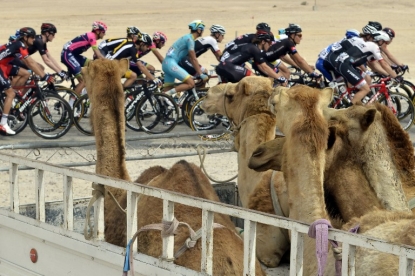 Cyclists ride past a truck carrying during the Tour of Qatar in February 2015 (AFP Photo / Lionel Bonaventure)
Cyclists ride past a truck carrying during the Tour of Qatar in February 2015 (AFP Photo / Lionel Bonaventure)Some of it undoubtedly is. It is possible in a Doha mall to catch an electronically-powered gondola (manned by a stripey-shirted gondolier, of course) all the way from a hallway made to look like a Parisian boulevard right up to the entrance of a Carrefour supermarket.
Camel Shepherd's Pie
But you can also dine on camel Shepherd’s Pie after visiting the latest collection at the Museum of Islamic Art, a building described to me by one person as the “jewel in the crown of all buildings in Qatar”.
And there are a lot of buildings in Qatar.
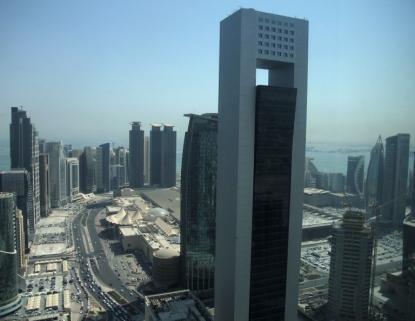 The Qatari capital Doha in October 2012 (AFP Photo / Patrick Baz)
The Qatari capital Doha in October 2012 (AFP Photo / Patrick Baz)The amount of construction in the emirate is breathtaking. It is the Wild Middle East, a modern-day frontier land with building work on a scale that is barely imaginable. Doha is constantly changing. A taxi ride can be a game of chance: there seem to be few addresses, just ever-growing neighbourhoods.
Construction work round the clock
Qatar is right now building an entire new port, metro, football stadiums, numerous malls as well as office blocks and roads, which means construction work is not only part of Doha’s landscape, it is part of the noisescape.
Construction continues 24 hours a day and in many parts of the city the hum of building work can be heard around the clock. The work sites stretch out beyond the fringes of Doha, as the city gives way to the barren, moonscape terrain before it becomes desert. North of the capital, an entirely new city of a quarter-million people is being built from scratch ahead of the 2022 World Cup.
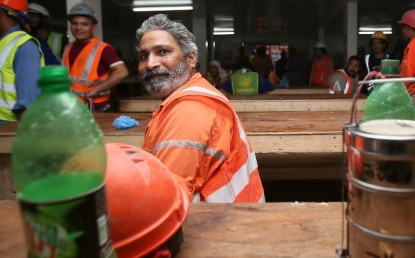 A migrant labourer breaks for lunch on a Doha construction site in October 2013 (AFP Photo / Al-Watan Doha / Karim Jaafar)
A migrant labourer breaks for lunch on a Doha construction site in October 2013 (AFP Photo / Al-Watan Doha / Karim Jaafar)This also means that the construction workers who are so often written about are anything but hidden away. They are everywhere and in vast numbers, a mass yellow-helmeted reminder of an issue that has become a global cause.
Desperate to keep jobs
They are easy to approach but not to talk to; understandably they are generally fearful of a stranger speaking to them, let alone a journalist. Their fear shows up a paradox of modern Qatari life; no matter how badly treated or paid they are - even, in some cases not paid at all – and no matter how many people campaign on their behalf, few will say so openly. Tens of thousands of migrant workers are desperate to keep their jobs in Qatar, as the only way to support their families back home.
Their presence illustrates a major aspect of daily life in Qatar: its vast proportion of immigrants. This is a country of just over two million people, around 90 percent of whom are foreigners – come from more than 60 nations to help build this new El Dorado in the Gulf.
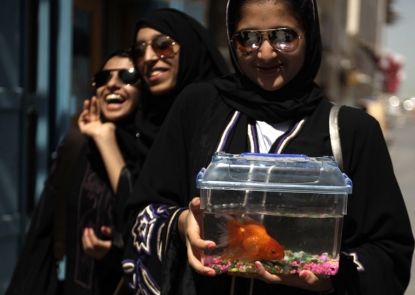 Qatari women at the pet market in Souq Waqif in Doha in March 2010 (AFP Photo / Patrick Baz)
Qatari women at the pet market in Souq Waqif in Doha in March 2010 (AFP Photo / Patrick Baz)Statistically, you are twice as likely to meet someone from India as from Qatar. And you are three times as likely to meet a man as a woman. The vast number of male labourers among the immigrant population has toppled the gender balance, with Qatar counting 75 percent men to just 25 percent women.
Some boundaries are set, others less
Most of my interactions with Qatari locals are through official channels. Like anywhere in the world, the people I meet are a mixture of friendly, good-looking, rude and family-loving. Many are conservatively but immaculately dressed and perfumed. Many are aggressive drivers. Some are overweight – Qatar has a growing obesity problem, in common with newly-wealthy countries around the world. Many seem to dislike the ferocious temperatures of their own summer, much like your average FIFA official. Qataris watch “X-Factor” and “Arabs Got Talent” in numbers, and they - like much of the world’s population - are obsessed with smartphones.
 A Qatari man works on his laptop at the Souq Waqif market in the old city of Doha in March 2010 (AFP Photo / Patrick Baz)
A Qatari man works on his laptop at the Souq Waqif market in the old city of Doha in March 2010 (AFP Photo / Patrick Baz)It may be jarring to a Western eye, but where you come from in the world pretty much determines what job you do in Qatar. Construction workers are largely from Nepal, Bangladesh or India, maids seem to be drawn from the Philippines, Westerners are the white-collar staff and taxi drivers seem to come either from Kerala or Kenya. Those boundaries are set. The exception to the rule is Qatar’s Indian population, the largest grouping within the country at over 500,000 people and with a burgeoning middle class.
And yet the social boundaries in this conservative Muslim country are not quite as fixed as an outsider may think. Not too long ago, I was invited to sit at a lunch table by a female Qatari who was all on her own. As an awkward Westerner, I had no idea what I should do. After much hand-wringing, it turned out I had a pleasant chat over a nice lunch.
There is so much going on here - good and bad - it would take a willful effort not to be fascinated by Qatar. I sometimes feel as if I am living in SimCity, the never-ending city-building computer game. Somebody should open a bureau here.
David Harding is AFP’s correspondent in Doha
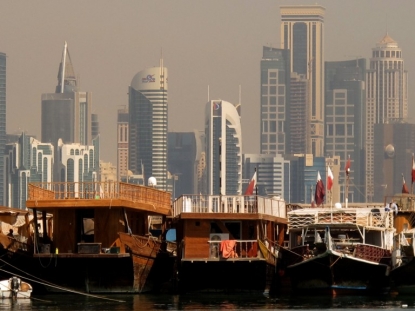 Boat moored with the Doha skyline in the background in October 2012 (AFP Photo / Patrick Baz)
Boat moored with the Doha skyline in the background in October 2012 (AFP Photo / Patrick Baz)

